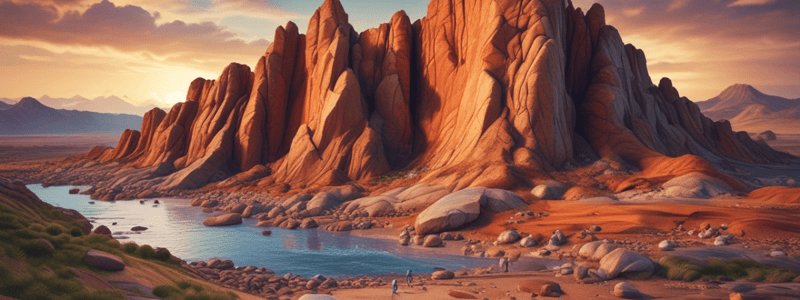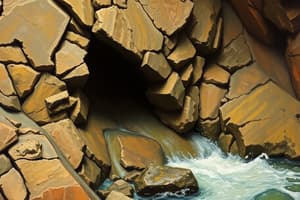Podcast
Questions and Answers
What is the main function of the ozone layer in the Earth's atmosphere?
What is the main function of the ozone layer in the Earth's atmosphere?
- To create thunderstorms
- To regulate global temperatures
- To produce stratiform clouds
- To absorb harmful ultraviolet radiation from the sun (correct)
What is the primary cause of earthquakes?
What is the primary cause of earthquakes?
- Formation of cumulonimbus clouds
- Movement of tectonic plates beneath the Earth's surface
- Rapid cooling of the Earth's core
- Release of energy along faults in the Earth's crust (correct)
What type of weather front leads to the formation of stratiform clouds and steady precipitation?
What type of weather front leads to the formation of stratiform clouds and steady precipitation?
- Warm front (correct)
- Stationary front
- Cold front
- Occluded front
In chemistry, what type of bond involves the sharing of electrons between atoms?
In chemistry, what type of bond involves the sharing of electrons between atoms?
Which atmospheric layer is characterized by the presence of the ozone layer?
Which atmospheric layer is characterized by the presence of the ozone layer?
What type of mass displacement leads to the formation of cumulonimbus clouds and thunderstorms?
What type of mass displacement leads to the formation of cumulonimbus clouds and thunderstorms?
What is the primary reason for clouds and precipitation in low-pressure systems?
What is the primary reason for clouds and precipitation in low-pressure systems?
Which type of bond allows for the flow of electrons between metal atoms?
Which type of bond allows for the flow of electrons between metal atoms?
What type of rock formation is the result of the accumulation and compression of sediment layers over time?
What type of rock formation is the result of the accumulation and compression of sediment layers over time?
Which type of igneous rock is formed when magma cools beneath the Earth's surface?
Which type of igneous rock is formed when magma cools beneath the Earth's surface?
What type of rock is created when existing rocks undergo intense heat and pressure deep within the Earth's crust?
What type of rock is created when existing rocks undergo intense heat and pressure deep within the Earth's crust?
Which characteristic textures are often associated with metamorphic rocks like slate or marble?
Which characteristic textures are often associated with metamorphic rocks like slate or marble?
What process causes the minerals within rocks to recrystallize, forming new minerals in metamorphic rocks?
What process causes the minerals within rocks to recrystallize, forming new minerals in metamorphic rocks?
Which type of igneous rocks form rapidly when lava erupts onto the Earth's surface?
Which type of igneous rocks form rapidly when lava erupts onto the Earth's surface?
Which atmospheric layer is directly above the stratosphere?
Which atmospheric layer is directly above the stratosphere?
What is the primary cause of the release of gases and lava during volcanic eruptions?
What is the primary cause of the release of gases and lava during volcanic eruptions?
Which type of chemical bond involves the transfer of electrons between atoms?
Which type of chemical bond involves the transfer of electrons between atoms?
In high-pressure systems, what process inhibits the formation of clouds and precipitation?
In high-pressure systems, what process inhibits the formation of clouds and precipitation?
Which type of weather front is associated with the rapid lifting of warm air and the formation of cumulonimbus clouds and thunderstorms?
Which type of weather front is associated with the rapid lifting of warm air and the formation of cumulonimbus clouds and thunderstorms?
What is the primary reason for the shaking of the ground during an earthquake?
What is the primary reason for the shaking of the ground during an earthquake?
Which type of chemical bond is responsible for the formation of metallic lattices and the conduction of electricity in metals?
Which type of chemical bond is responsible for the formation of metallic lattices and the conduction of electricity in metals?
What process is primarily responsible for the formation of sedimentary rocks?
What process is primarily responsible for the formation of sedimentary rocks?
Which atmospheric layer is characterized by the presence of the ozone layer that absorbs harmful ultraviolet radiation from the sun?
Which atmospheric layer is characterized by the presence of the ozone layer that absorbs harmful ultraviolet radiation from the sun?
What type of igneous rock is formed when magma cools slowly beneath the Earth's surface?
What type of igneous rock is formed when magma cools slowly beneath the Earth's surface?
Which process is primarily responsible for the formation of sedimentary rocks?
Which process is primarily responsible for the formation of sedimentary rocks?
What is the primary distinction between intrusive and extrusive igneous rocks?
What is the primary distinction between intrusive and extrusive igneous rocks?
Which of the following is NOT a factor that contributes to the formation of metamorphic rocks?
Which of the following is NOT a factor that contributes to the formation of metamorphic rocks?
What is the primary advantage of studying rock formations for geologists?
What is the primary advantage of studying rock formations for geologists?
Which of the following statements about igneous rocks is NOT true?
Which of the following statements about igneous rocks is NOT true?
What is the primary cause of the recrystallization of minerals within existing rocks, leading to the formation of metamorphic rocks?
What is the primary cause of the recrystallization of minerals within existing rocks, leading to the formation of metamorphic rocks?
Which of the following is NOT an example of a sedimentary rock?
Which of the following is NOT an example of a sedimentary rock?
Which of the following statements about rock formations is true?
Which of the following statements about rock formations is true?
What is the primary distinction between sedimentary and metamorphic rocks?
What is the primary distinction between sedimentary and metamorphic rocks?
Which of the following factors is NOT involved in the formation of rock formations?
Which of the following factors is NOT involved in the formation of rock formations?
Flashcards are hidden until you start studying
Study Notes
Rock Formations
- Sedimentary rocks are formed through the accumulation and compression of sediment layers over time.
- These layers can be made up of minerals, organic matter, or even the remains of plants and animals.
- Igneous rocks are formed from the cooling and solidification of magma or lava.
- Intrusive igneous rocks like granite are formed when magma cools beneath the Earth's surface.
- Extrusive igneous rocks like basalt are formed when lava erupts onto the Earth's surface and cools rapidly.
- Metamorphic rocks are formed when existing rocks undergo intense heat and pressure deep within the Earth's crust.
Atmospheric Layers
- The Earth's atmosphere is divided into several layers based on temperature variations and composition.
- The troposphere is the lowest layer and is where weather phenomena occur.
- The stratosphere contains the ozone layer that absorbs harmful ultraviolet radiation from the sun.
- Above the stratosphere lies the mesosphere, followed by the thermosphere and exosphere.
Volcanoes and Earthquakes
- Volcanoes occur at points where magma from the Earth's mantle erupts onto the surface, often forming mountains and releasing gases and lava.
- Earthquakes are caused by the sudden release of energy along faults in the Earth's crust, leading to the shaking of the ground.
Weather Fronts
- Cold fronts form when a cold air mass advances and displaces a warmer air mass, leading to the rapid lifting of warm air and the formation of cumulonimbus clouds and thunderstorms.
- Warm fronts occur when a warm air mass advances over a colder air mass, leading to gradual lifting of the colder air and the formation of stratiform clouds and steady precipitation.
Pressure Systems
- Low-pressure systems are associated with unsettled weather conditions, including clouds, precipitation, and atmospheric instability.
- High-pressure systems are associated with stable weather conditions, including clear skies, light winds, and dry conditions.
Chemical Bonding
- Covalent bonds involve the sharing of electrons between atoms, resulting in the formation of molecules like water or methane.
- Ionic bonds involve the transfer of electrons between atoms, resulting in the formation of ions and compounds like sodium chloride or magnesium oxide.
- Metallic bonds occur between metal atoms, allowing for the flow of electrons and the formation of metallic lattices.
Studying That Suits You
Use AI to generate personalized quizzes and flashcards to suit your learning preferences.



